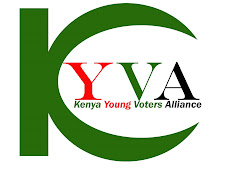KYVA is a conglomerate of organizations and individuals committed to ensuring that Kenya as a country manages to achieve set developmental goals to meet both the international and national targets. The idea was mooted by the (SONU) leadership of 2003/4. KYVA leadership is composed of diverse backgrounds and experiences. We urge all Kenyan youths to take charge of leadership at the counties and national levels. Register as voters and vote in large numbers for young visionary leaders.
Sunday, February 13, 2011
JUDICIARY MUST "LIFT THE CORPORATE VEIL" TO RECOVER STOLEN PUBLIC FUNDS AND PROPERTY.
In legal law and jurisprudence there exist three theories of legal personality: the realist, fiction and objective theories. But, it is the fiction personality theory that is quite controversial. Here, non-human or artificial bodies’ (such as companies) maybe legal entities through the fiction that human beings provide the mind and soul (corpus and animus). It therefore follows that companies have a legal identity as well as the right to own property. Companies can also sue as well as be sued in a court of law.
However, such legal entities cannot be physically present in a court of law for offences committed. Besides, such entities cannot be accused of perjury. Furthermore, unless it is through liquidation or winding up, they cannot be punished by death nor can they be subject to corporate punishment.
Given the above limitations Kenya has witnessed a worrying trend where wily individuals use companies as their alter ego. Here, a company is deliberately used to provide a legal shield for the wily individuals operating the company for their selfish intents. Such companies (some of which seem to enjoy protection from the political establishments of the day) have often gone under just before or soon after the respective political regimes come to an end. These conniving individuals hide behind “the limited liability” (which is metaphorically referred to as the “corporate veil”) whenever they are called upon to account for their mischief.
However, this protection may be pierced and personal liability imposed by the courts of law when a wily shareholder operates the company as an “alter ego” for wrongful purposes. It must be underscored that this veil is not in itself an absolute shield.
According to Wikipedia “piercing the corporate veil” is a legal decision to treat the rights or duties of a company as the rights or liabilities of its shareholders or directors. Usually a company is treated as a separate legal person, which is solely responsible for the debts it incurs and the sole beneficiary of the credit it is owed. Common law countries usually uphold this principle of separate personhood, but in exceptional situations courts of law may "pierce" or "lift" the corporate veil.
This doctrine is used by the courts to ignore the corporate status of a group of stockholders, officers, and directors of a corporation in reference to their limited liability so that they may be held personally liable for their actions when they have acted fraudulently or unjustly.
In order to have a better understanding of what “piercing the veil of a company” entails, let us take the example of a business man who leaves his job upon signing a contract forbidding him from competing with the company he has just left for a period of time. If he goes ahead to set up a company which competes with his former company, technically it would be the company and not the person competing. However, it is likely that a court of law would say that the new company was just a "sham", a "fraud" and would therefore allow the old company to sue the man for breach of contract.
A court of law would thus look beyond the legal fiction to the reality of the situation. Several courts have determined that the alter ego doctrine can be applied to Limited Liability Companies. In the US for instance, in Kaycee Land & Livestock versus Flahive, (2002), the Wyoming Supreme Court held that the equitable doctrine of piercing the veil was an available remedy under the Wyoming Limited Liability Company Act. In the UK, the corporate veil was lifted in the case between Gencor versus Dalby, because the company was the "alter ego" of the defendant.
From the foregoing, despite the terminology used that makes it appear as though a shareholder's limited liability emanates from the view that a company is a separate legal entity, the reality is that the entity status of companies has almost nothing to do with shareholder limited liability.
“Piercing the corporate veil” is therefore the only means of breaking down a wily individual`s protection. This is mostly done when such a company is the wily shareholder`s “alter ego” and is a sham or façade used to evade creditors or to defraud the public.
Given the soaring corruption cases in Kenya revolving around limited liability companies, it is the public`s expectation that the Kenyan courts would rise to the occasion by “lifting the corporate veil” to expose the real fraudsters. It would make a lot of social and economic sense if a company is barred from being the alter ego of the principal corporate.
Subscribe to:
Post Comments (Atom)

No comments:
Post a Comment